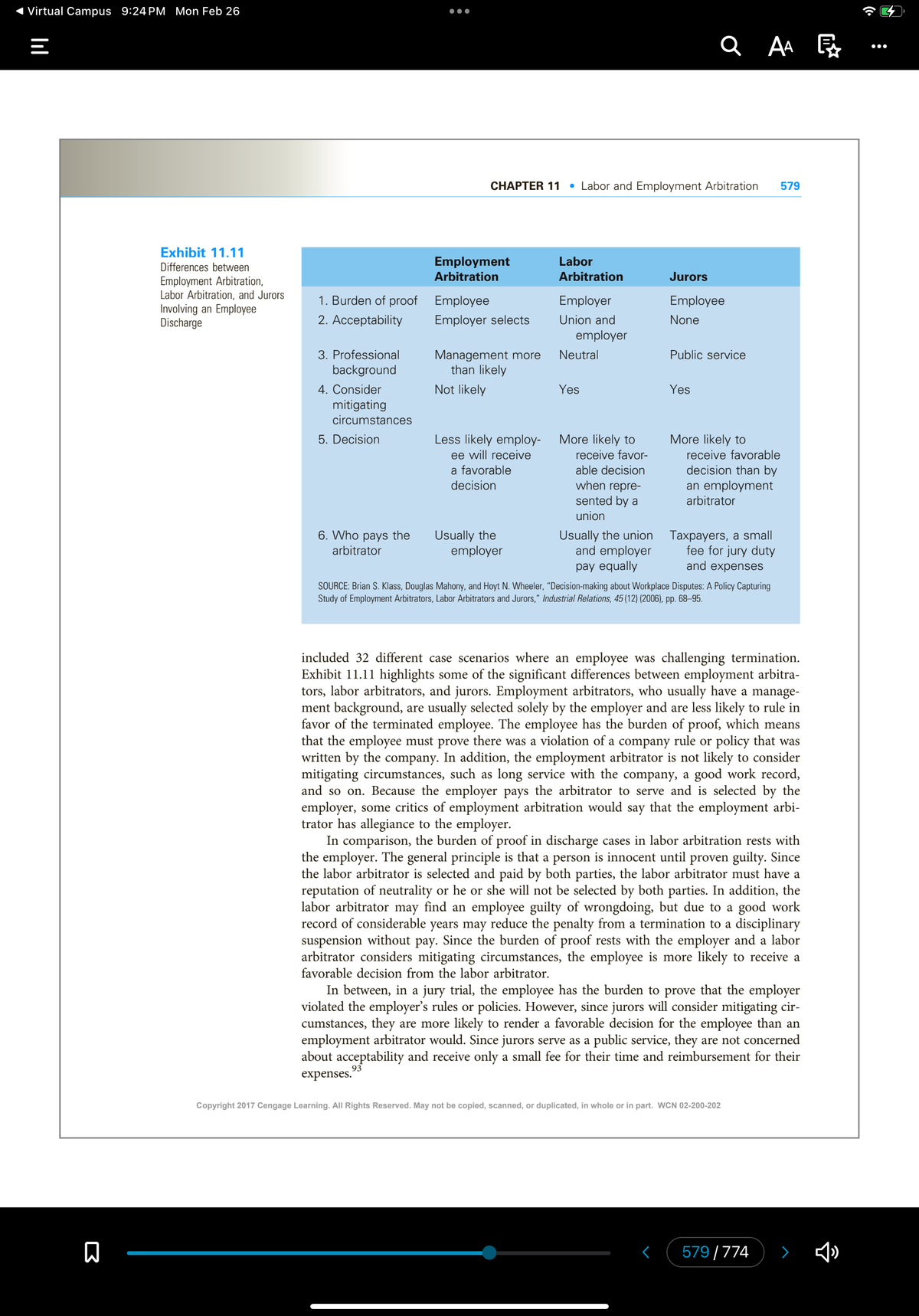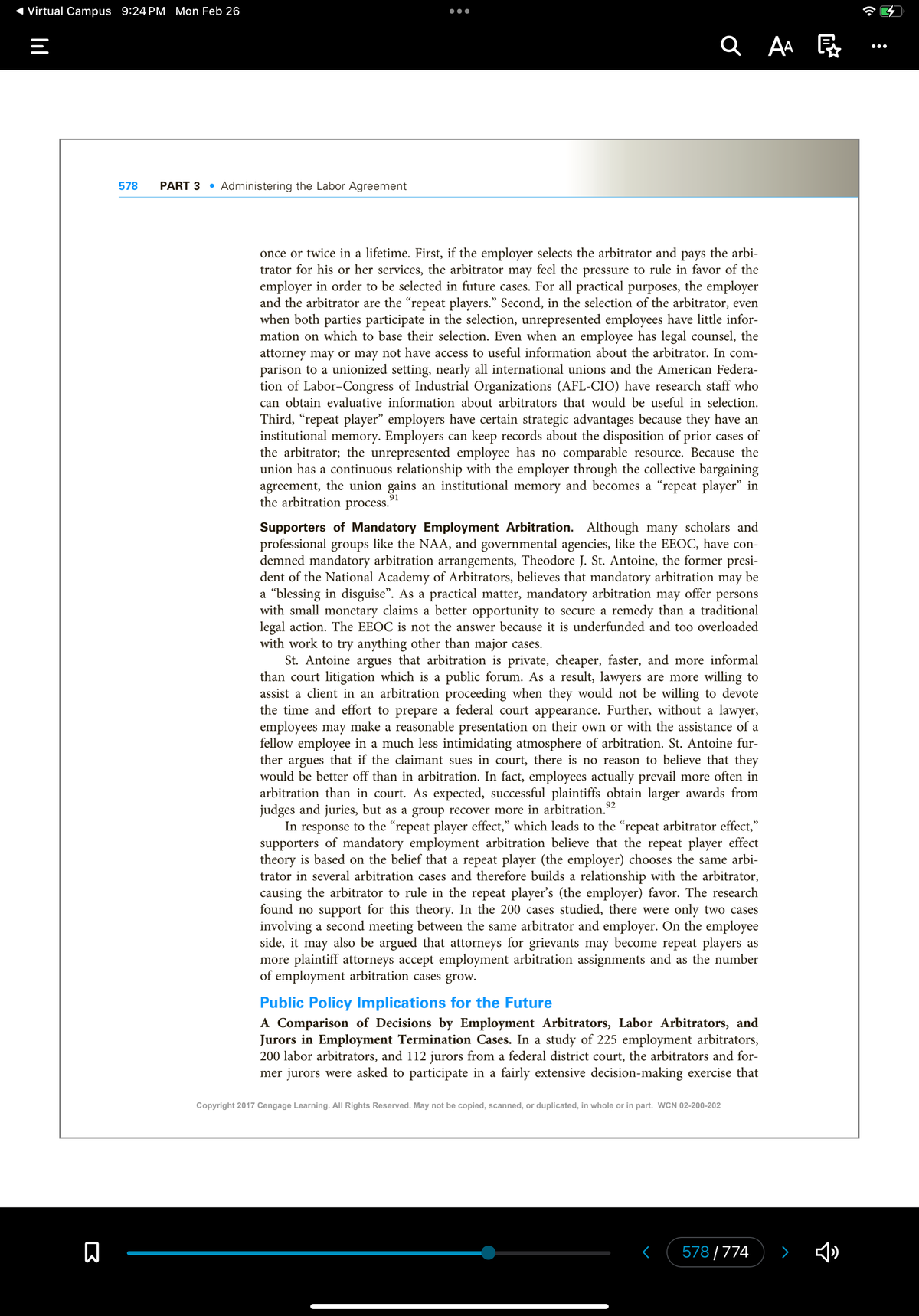Did managers disregard proper procedure when they disciplined Mr. Haier? Justify your answer. How much weight should arbitrators give procedural propriety or impropriety when deciding a case like this one?
Did managers disregard proper procedure when they disciplined Mr. Haier? Justify your answer. How much weight should arbitrators give procedural propriety or impropriety when deciding a case like this one?
Chapter1: Taking Risks And Making Profits Within The Dynamic Business Environment
Section: Chapter Questions
Problem 1CE
Related questions
Question
- Did managers disregard proper procedure when they disciplined Mr. Haier? Justify your answer. How much weight should arbitrators give procedural propriety or impropriety when deciding a case like this one?

Transcribed Image Text:Virtual Campus 9:24 PM Mon Feb 26
|||
B
Exhibit 11.11
Differences between
Employment Arbitration,
Labor Arbitration, and Jurors
Involving an Employee
Discharge
1. Burden of proof
2. Acceptability
3. Professional
background
4. Consider
mitigating
circumstances
5. Decision
6. Who pays the
arbitrator
●●●●
Employment
Arbitration
CHAPTER 11 • Labor and Employment Arbitration 579
Employee
Employer selects
Management more
than likely
Not likely
Less likely employ-
ee will receive
a favorable
decision
Usually the
employer
Labor
Arbitration
Employer
Union and
employer
Neutral
Yes
More likely to
receive favor-
able decision
when repre-
sented by a
union
Usually the union
and employer
pay equally
a
Jurors
Employee
None
Yes
2 AA
Public service
More likely to
receive favorable
decision than by
an employment
arbitrator
Taxpayers, a small
fee for jury duty
and expenses
SOURCE: Brian S. Klass, Douglas Mahony, and Hoyt N. Wheeler, "Decision-making about Workplace Disputes: A Policy Capturing
Study of Employment Arbitrators, Labor Arbitrators and Jurors,” Industrial Relations, 45 (12) (2006), pp. 68–95.
included 32 different case scenarios where an employee was challenging termination.
Exhibit 11.11 highlights some of the significant differences between employment arbitra-
tors, labor arbitrators, and jurors. Employment arbitrators, who usually have a manage-
ment background, are usually selected solely by the employer and are less likely to rule in
favor of the terminated employee. The employee has the burden of proof, which means
that the employee must prove there was a violation of a company rule or policy that was
written by the company. In addition, the employment arbitrator is not likely to consider
mitigating circumstances, such as long service with the company, a good work record,
and so on. Because the employer pays the arbitrator to serve and is selected by the
employer, some critics of employment arbitration would say that the employment arbi-
trator has allegiance to the employer.
In comparison, the burden of proof in discharge cases in labor arbitration rests with
the employer. The general principle is that a person is innocent until proven guilty. Since
the labor arbitrator is selected and paid by both parties, the labor arbitrator must have a
reputation of neutrality or he or she will not be selected by both parties. In addition, the
labor arbitrator may find an employee guilty of wrongdoing, but due to a good work
record of considerable years may reduce the penalty from a termination to a disciplinary
suspension without pay. Since the burden of proof rests with the employer and a labor
arbitrator considers mitigating circumstances, the employee is more likely to receive a
favorable decision from the labor arbitrator.
In between, in a jury trial, the employee has the burden to prove that the employer
violated the employer's rules or policies. However, since jurors will consider mitigating cir-
cumstances, they are more likely to render a favorable decision for the employee than an
employment arbitrator would. Since jurors serve as a public service, they are not concerned
about acceptability and receive only a small fee for their time and reimbursement for their
expenses.
93
Copyright 2017 Cengage Learning. All Rights Reserved. May not be copied, scanned, or duplicated, in whole or in part. WCN 02-200-202
579/774
>

Transcribed Image Text:| Virtual Campus 9:24 PM Mon Feb 26
||||
=
B
578
PART 3 ● Administering the Labor Agreement
●●●●
QAA
once or twice in a lifetime. First, if the employer selects the arbitrator and pays the arbi-
trator for his or her services, the arbitrator may feel the pressure to rule in favor of the
employer in order to be selected in future cases. For all practical purposes, the employer
and the arbitrator are the "repeat players." Second, in the selection of the arbitrator, even
when both parties participate in the selection, unrepresented employees have little infor-
mation on which to base their selection. Even when an employee has legal counsel, the
attorney may or may not have access to useful information about the arbitrator. In com-
parison to a unionized setting, nearly all international unions and the American Federa-
tion of Labor-Congress of Industrial Organizations (AFL-CIO) have research staff who
can obtain evaluative information about arbitrators that would be useful in selection.
Third, "repeat player" employers have certain strategic advantages because they have an
institutional memory. Employers can keep records about the disposition of prior cases of
the arbitrator; the unrepresented employee has no comparable resource. Because the
union has a continuous relationship with the employer through the collective bargaining
agreement, the union gains an institutional memory and becomes a "repeat player” in
the arbitration process.
91
Supporters of Mandatory Employment Arbitration. Although many scholars and
professional groups like the NAA, and governmental agencies, like the EEOC, have con-
demned mandatory arbitration arrangements, Theodore J. St. Antoine, the former presi-
dent of the National Academy of Arbitrators, believes that mandatory arbitration may be
a “blessing in disguise”. As a practical matter, mandatory arbitration may offer persons
with small monetary claims a better opportunity to secure a remedy than a traditional
legal action. The EEOC is not the answer because it is underfunded and too overloaded
with work to try anything other than major cases.
St. Antoine argues that arbitration is private, cheaper, faster, and more informal
than court litigation which is a public forum. As a result, lawyers are more willing to
assist a client in an arbitration proceeding when they would not be willing to devote
the time and effort to prepare a federal court appearance. Further, without a lawyer,
employees may make a reasonable presentation on their own or with the assistance of a
fellow employee in a much less intimidating atmosphere of arbitration. St. Antoine fur-
ther argues that if the claimant sues in court, there is no reason to believe that they
would be better off than in arbitration. In fact, employees actually prevail more often in
arbitration than in court. As expected, successful plaintiffs obtain larger awards from
judges and juries, but as a group recover more in arbitration.⁹²
In response to the “repeat player effect," which leads to the "repeat arbitrator effect,"
supporters of mandatory employment arbitration believe that the repeat player effect
theory is based on the belief that a repeat player (the employer) chooses the same arbi-
trator in several arbitration cases and therefore builds a relationship with the arbitrator,
causing the arbitrator to rule in the repeat player's (the employer) favor. The research
found no support for this theory. In the 200 cases studied, there were only two cases
involving a second meeting between the same arbitrator and employer. On the employee
side, it may also be argued that attorneys for grievants may become repeat players as
more plaintiff attorneys accept employment arbitration assignments and as the number
of employment arbitration cases grow.
Public Policy Implications for the Future
A Comparison of Decisions by Employment Arbitrators, Labor Arbitrators, and
Jurors in Employment Termination Cases. In a study of 225 employment arbitrators,
200 labor arbitrators, and 112 jurors from a federal district court, the arbitrators and for-
mer jurors were asked to participate in a fairly extensive decision-making exercise that
Copyright 2017 Cengage Learning. All Rights Reserved. May not be copied, scanned, or duplicated, in whole or in part. WCN 02-200-202
578/774
>
Expert Solution
This question has been solved!
Explore an expertly crafted, step-by-step solution for a thorough understanding of key concepts.
This is a popular solution!
Trending now
This is a popular solution!
Step by step
Solved in 3 steps

Recommended textbooks for you

Understanding Business
Management
ISBN:
9781259929434
Author:
William Nickels
Publisher:
McGraw-Hill Education

Management (14th Edition)
Management
ISBN:
9780134527604
Author:
Stephen P. Robbins, Mary A. Coulter
Publisher:
PEARSON

Spreadsheet Modeling & Decision Analysis: A Pract…
Management
ISBN:
9781305947412
Author:
Cliff Ragsdale
Publisher:
Cengage Learning

Understanding Business
Management
ISBN:
9781259929434
Author:
William Nickels
Publisher:
McGraw-Hill Education

Management (14th Edition)
Management
ISBN:
9780134527604
Author:
Stephen P. Robbins, Mary A. Coulter
Publisher:
PEARSON

Spreadsheet Modeling & Decision Analysis: A Pract…
Management
ISBN:
9781305947412
Author:
Cliff Ragsdale
Publisher:
Cengage Learning

Management Information Systems: Managing The Digi…
Management
ISBN:
9780135191798
Author:
Kenneth C. Laudon, Jane P. Laudon
Publisher:
PEARSON

Business Essentials (12th Edition) (What's New in…
Management
ISBN:
9780134728391
Author:
Ronald J. Ebert, Ricky W. Griffin
Publisher:
PEARSON

Fundamentals of Management (10th Edition)
Management
ISBN:
9780134237473
Author:
Stephen P. Robbins, Mary A. Coulter, David A. De Cenzo
Publisher:
PEARSON